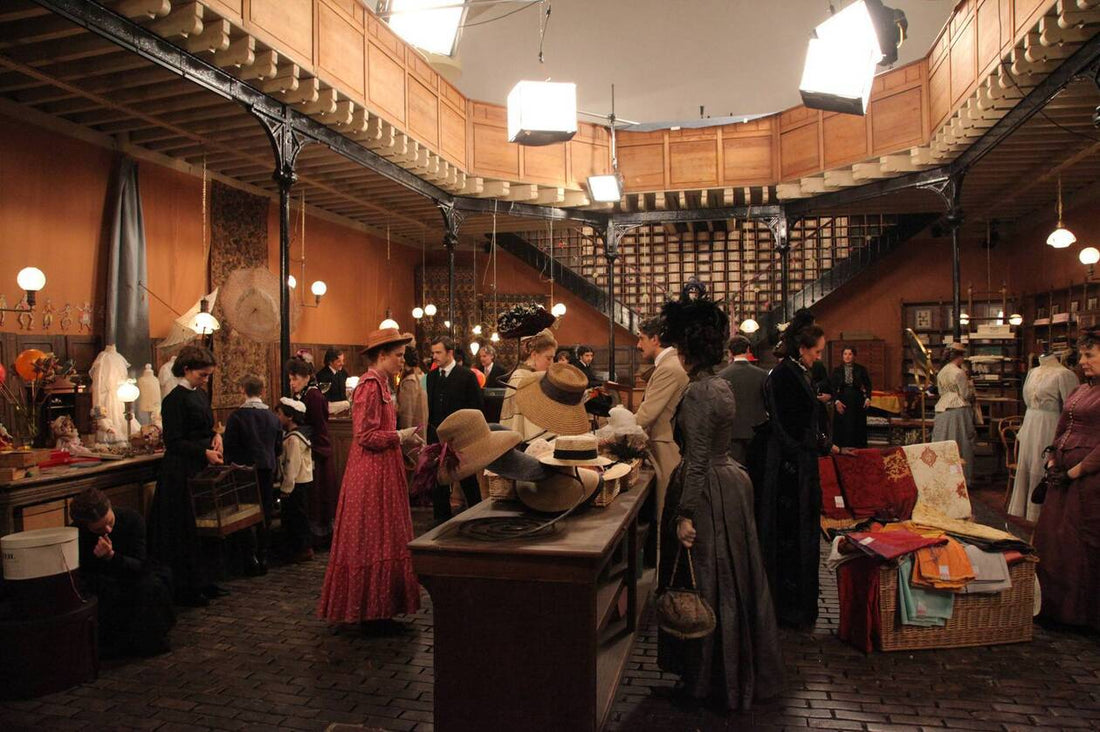
The History of Seasonal Sales: a French tradition at the service of small businesses
Share
Bonjour! Sales will start soon.
This period long awaited by some and so criticized by others.
This would not be the first time that we have been questioned about the consistency of being a small ecological business and still offering discounts during Sales.
So, we're taking you on a journey through time as we explore the history of seasonal sales.
In this blog post, we'll dig deeper into why and when Sales were introduced, with a particular focus on their rich French heritage.
Ah yes, because we all criticize the unbridled American consumption, but did you know that the Sales have indeed been invented in Paris?
The origins of these events are of enormous importance for small businesses and at the very beginning this is exactly why the Seasonal Sales have become an integral part of the French cultural and economic fabric.
So, grab a croissant and embark on this illuminating exploration of the history of sales!
The Humble Origins of Sales
The tradition of selling at a reduced price goes deep back in time. This strategy, which has been present in the goods markets for centuries, has always been a way for small traders to recover a minimum to continue producing food and other products.
The notion of “Seasonal Sales” we find it in the coupon of unsold or remaining fabric that the trader sold at a low price. You guessed it: this coupon was known as "solde" (meaning Sale in French).
It all started in the bustling streets of Paris, where fabric traders faced the challenge of emptying stocks of unfinished rolls of fabric to make room for new collections.
This phenomenon was of course accentuated at the end of the season! Because in winter nobody bought the fine and light fabrics of summer and with good weather customers no longer wanted warm and thick fabrics for the cold!
This led to the birth of seasonal "sales" periods when goods were sold at reduced prices, at the end of winter or summer!
While this practice seems very specific to fabric traders, how did it spread?

Sales as we know them today!
Once again, it all started in Paris, the result of a new way of selling: department stores!
In the beginnings of the new concept of selling we find Simon Mannoury, a Norman who came to Paris to sell fabrics.
Creative and full of ideas, Mannoury dives into the new wave of “novelty stores” which are gradually replacing traditional specialised stores.
But Mannoury does not stop there. In his Parisian store Petit Saint-Thomas he definitely breaks the idea of the traditional counter and opens the shelves to the free circulation of customers.
To do this Mannoury "invents" the price labels. Later he even adopts mail order sales.
Petit Saint-Thomas offers more and more different products. It accumulates more and more unsold products too.
Et voila ! Les “Soldes” (sales) are born in 1830 at Petit Saint-Thomas, at the corner of rue du Bac and rue de l'Université, a stone's throw from the Saint-Thomas-d'Aquin church.
The success of these operations close to the public does not go unnoticed! Other Parisian stores such as Le Bazar de l’Hôtel de Ville (BHV), Les Galeries Lafayette, Le Bon Marché… every department store adopts the concept of seasonal sales.
Because the public was waiting for it, because the competition was becoming excessive and unsold items were piling up all over, too quickly, sales were the only way to go!
We strongly recommend the romance “Au bonheur des dames” (1883), by Emile Zola. A very realistic and precise account of this time which marks a great change in trade.

Bon Marche_Docu-Fiction published on ARTE
The need for rules
This race to the Sales therefore had to be regulated.
The very first legislation dates from 1906.
"The sales promote an accelerated flow of goods in stock, copies of which have been offered for sale for at least one month and include a price reduction, which may go as far as a resale at a loss, within the limit of the stock to be sold. Balances can only be made during two periods per calendar year”.
In 1962, the law further specified the contours. And in 1996, a decree establishes the duration of sales and the obligations of sellers that we all know today.
Expansion to the world
Outside of France, department stores, such as Macy's and Sears in the United States, have played a central role in popularizing the Sales among consumers. The idea of limited time offers and special promotions created a sense of urgency, enticing customers to make purchases.
A remarkable event that cemented the Sale culture was the Great Depression in the 1930s.
As economic difficulties prevailed, companies were looking for innovative ways to stimulate demand. The Sale has become a lifeline for struggling retailers, allowing them to increase sales volumes and keep their doors open during difficult times.

The importance of seasonal sales for small businesses
While many question overconsumption during Sales periods, when the rules are followed and common sense prevails, seasonal Sales are very beneficial to small family businesses like ours!
The reasons are multiple and, contrary to what we may think, they are not necessarily based on an unbridled desire to increase income.
1. Liquidation or re-balancing of inventory:
Unfortunately, not all the ideas are good, not all the colors are accepted in the same way… In reality it is almost impossible to create collections where all the products are sold at the same rate, with the same success.
Unlike big brands, most small producers and family businesses need to sell a large majority of products in stock to have the capacity to develop new collections or simply buy more raw materials.
The seasonal sales help us to find the balance of stocks and to be able to readjust our offer.

2. Meet the expectations and needs of the public:
Since the beginning of the sales, the public has become accustomed to waiting for sales periods to buy.
There are even customers who do not buy during the year, keeping their saves exclusively for sale products! Sometimes it has nothing to do with wanting to buy more. The current international situation means that these buying habits have become a need for budgetary issues.
And the greater the purchase value of a product, the more people tend not to buy except during discount periods. This concerns, for example, the Universe of the House, that include us!
For a small business, sales periods are therefore an opportunity to make themselves known and to be valued by a new audience: all those clients that simply don’t by during the year.
This is the only way to be visible to all those who do not research new products outside of these periods.
3. Stand out as a sustainable alternative:
While in the ideal conscious consumption would naturally impose itself, we prefer to remain realistic:
The public will always buy more during sales periods!
Human beings love beautiful things and need more and more objects to suit their lifestyle. Compulsive buying is a reality and will continue to be so for a long time to come.
It is therefore important that the public is confronted with offers from conscious brands that promote sustainable and environmentally friendly production.
During sales periods, when the whole world is wanting to buy, the public must find sustainable alternatives! Committed objects, produced locally and with ecological materials.
If the public is going to buy, then is better if they buy quality products!

From their humble beginnings in 19th century Paris to becoming a cherished tradition around the world, Seasonal Sales have left a deep mark on our cultural and economic landscape.
Small businesses in particular benefit greatly from these events, taking advantage of increased brand exposure opportunities.
So, the next time you shop during a Sales period, keep a little thought about the historical significance of these and the role they play in supporting local businesses.
We can all be increasingly conscious consumers.
Good shopping !




